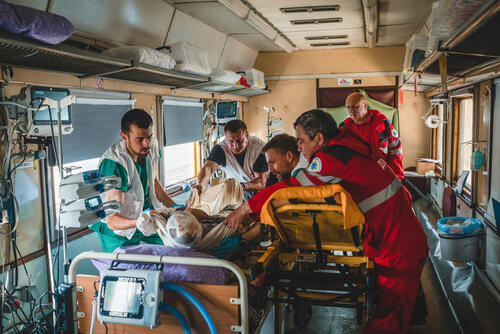War in Ukraine: The MSF physio teams helping overcome life-changing injuries
The war in Ukraine has left huge numbers of people with severe injuries. However, with limited access to physiotherapy or rehabilitation in the country’s hard-hit healthcare system, many patients face the risk of major long-term consequences.
Outside the Kyiv Medical Centre, taxis and cars begin to arrive, dropping off people on crutches to start their cautious walk into the hospital.
Many have had a leg amputated, up to the knee or higher. These are war-wounded patients learning to live in a new reality.
Following the outbreak of war in February, the healthcare system in Ukraine is facing a major challenge with the rehabilitation of patients who have been injured in the intense and often brutal fighting.
“I lost my leg immediately. The explosion was so powerful that one of my sneakers just burned to ashes.”
Fragments of shells tear off arms and legs, wounds that aren’t treated quickly become infected, and limbs have to be amputated to save people’s lives.
This means that, according to the Ukrainian Ministry of Health, the need for physiotherapists has doubled since the war started.
The scale of the situation
Faced with this situation, the healthcare system is unable to meet the huge needs – partly because of the mere scale of the issue, partly because rehabilitation hasn’t traditionally been a focus.
In Vinnytsia and Kyiv, teams from Médecins Sans Frontières / Doctors Without Borders (MSF) are now providing rehabilitative physiotherapy and post-operative healthcare to war-wounded patients.
This involves assessing injuries and providing treatment with assistive devices and physiotherapy. Importantly, we also provide individual psychological or psychiatric treatment to support patients to overcome the physical and mental health consequences of their injury.
Never miss an update
Get the latest news on war and conflict with our email newsletter, Frontline.
You'll also receive our best stories, critical updates and unique ways to get involved.
“We see dozens of patients who have lost their limbs – their legs, their arms. Sometimes more than one,” says Tankred Stoebe, MSF medical coordinator.
“Our staff from other countries have good experience in treating war-wounded people. We do this in close collaboration with Ukrainian colleagues. So, we can learn from each other, building local capacity to face the increased needs for rehabilitative healthcare.”
A finger, an eye, a leg
MSF physiotherapist Ahmad Alrosan arrived in Ukraine from Jordan, where he works in an MSF hospital offering rehabilitation for trauma patients from Iraq, Yemen, Syria and Gaza. He has vast experience in treating patients who lost their limbs due to war-related injuries.
Among his patients in Ukraine is Renat, a 29-year-old man who lost a finger and an eye after a mine detonation and grenade explosion in Mariupol. Under Ahmad’s supervision, Renat practices clenching and unclenching his fist to stretch his hand muscles.
“He lost an eye, and the fingers of his both hands are mutilated,” says Ahmad.
“He has injuries all over his body including a broken wrist. He has had three surgeries already, two more ahead to remove the lingering shrapnel.”
Renat is visibly coping with the pain while being massaged by Ahmed. His injury is six months old already, but he had no access to early rehabilitative treatment which is why he now needs more vigorous physiotherapy. It takes time and patience.
“My fingers did not function, they were stiff. Now I can perform common actions the same as you or anyone else. I can hold a pen or take a cup,” says Renat.

Elsewhere in the hospital, Elise, another MSF physiotherapist, meets 30-year-old Vasyl and walks him down the corridor to the physiotherapy room. Vasyl is learning to live without his left leg which was amputated just above the knee.
“I stepped on a mine during demining works in the village of Novyi Bukiv, in the Chernihiv region,” says Vasyl.
“The village was under Russian control for over a month and a lot of landmines were planted. We had to clear them so the locals could come back to their homes.
“The metal detector missed a mine on the curb. It was a pressure-operated, anti-personnel mine. I lost my leg immediately. The explosion was so powerful that one of my sneakers just burned to ashes.”
Elise massages the injured leg of the patient and helps him to exercise his muscles. She also works on his surviving leg, which is connected to physiotherapeutic devices.
Practising his exercises in front of a mirror is very important for the patient, says Elise: seeing his healthy leg move in the mirror helps him to replicate the movement with his other leg and relieve phantom pain.
Mental health impact
Learning to overcome difficulties and work with the skeleton and muscles is important, but patients will also need psychological support.
The mental health consequences of a war injury depend on the type of injury itself. Many patients will face fundamental changes to their lives: getting used to walking on crutches, learning to use a prosthetic limb or being in a wheelchair. These take time and good coping mechanisms.
As so many of the war-wounded patients in Ukraine are young, they will live many years with a disability. This will be a long-term issue for the Ukrainian healthcare system and for the people who require physiotherapy and post-operative care.
Given the brutality of this war, MSF physiotherapists like Ahmed and Elise wonder how many more people will be injured, and how many more will need this important care in the future.
MSF and the war in Ukraine
Fighting in Ukraine has killed or injured thousands of people, while more than 13 million refugees have fled to neighbouring countries.
Médecins Sans Frontières / Doctors Without Borders (MSF) teams are working to deliver emergency medical aid to people still in Ukraine, as well as those now seeking safety in neighbouring countries.


